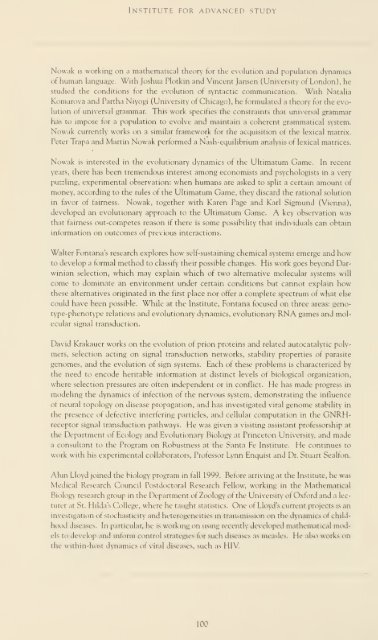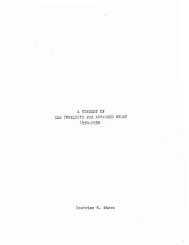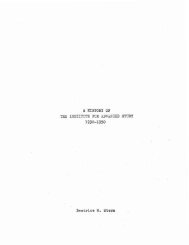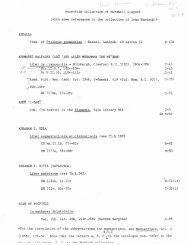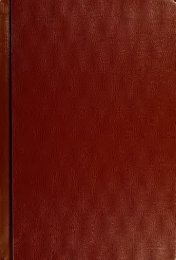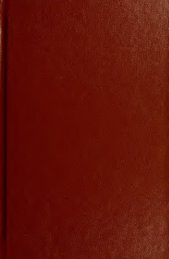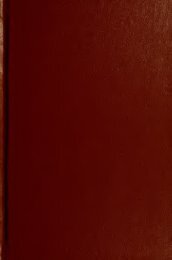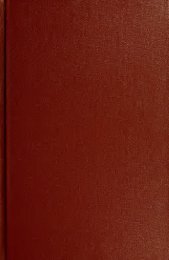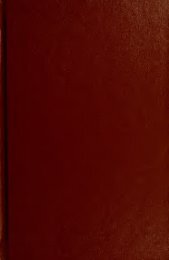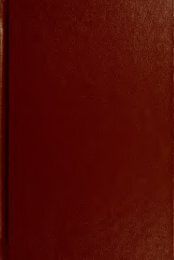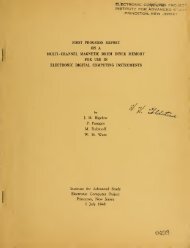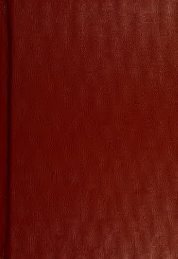Report for the academic year - Libraries - Institute for Advanced Study
Report for the academic year - Libraries - Institute for Advanced Study
Report for the academic year - Libraries - Institute for Advanced Study
Create successful ePaper yourself
Turn your PDF publications into a flip-book with our unique Google optimized e-Paper software.
<strong>Institute</strong> <strong>for</strong> advanced study<br />
Nowak is working n a ma<strong>the</strong>matical <strong>the</strong>ory <strong>for</strong> <strong>the</strong> evolution and population dynamics<br />
nt human language. With Joshua Plotkin and Vincent Jansen (University of London), he<br />
studied <strong>the</strong> conditions <strong>for</strong> <strong>the</strong> evolution of syntactic communication. With Natalia<br />
Komarova and Partha Niyogi (University of Chicago), he <strong>for</strong>mulated a <strong>the</strong>ory <strong>for</strong> <strong>the</strong> evolution<br />
"t universal grammar. This work specifies <strong>the</strong> constraints that universal grammar<br />
has to impose <strong>for</strong> a population to evolve and maintain a coherent grammatical system.<br />
Nowak currently works on a similar framework tor <strong>the</strong> acquisition of <strong>the</strong> lexical matrix.<br />
Peter Trapa and Martin Nowak per<strong>for</strong>med a Nash-equilibrium analysis of lexical matrices.<br />
Nowak is interested in <strong>the</strong> evolutionary dynamics of <strong>the</strong> Ultimatum Game. In recent<br />
<strong>year</strong>s, <strong>the</strong>re has been tremendous interest among economists and psychologists in a very<br />
puzzling, experimental observation: when humans are asked to split a certain amount of<br />
money, according to <strong>the</strong> rules of <strong>the</strong> Ultimatum Game, <strong>the</strong>y discard <strong>the</strong> rational solution<br />
in favor of fairness. Nowak, toge<strong>the</strong>r with Karen Page and Karl Sigmund (Vienna),<br />
developed an evolutionary approach to <strong>the</strong> Ultimatum Game. A key observation was<br />
that fairness out-competes reason if <strong>the</strong>re is some possibility that individuals can obtain<br />
in<strong>for</strong>mation on outcomes of previous interactions.<br />
Walter Fontana's research explores how self-sustaining chemical systems emerge and how<br />
to develop a <strong>for</strong>mal method to classify <strong>the</strong>ir possible changes. His work goes beyond Dar-<br />
winian selection, which may explain which of two alternative molecular systems will<br />
come to dominate an environment under certain conditions but cannot explain how<br />
<strong>the</strong>se alternatives originated in <strong>the</strong> first place nor offer a complete spectrum of what else<br />
could have been possible. While at <strong>the</strong> <strong>Institute</strong>, Fontana focused on three areas: geno-<br />
typ phenotype relations and evolutionary dynamics, evolutionary RNA games and mol-<br />
ecular signal transduction.<br />
David Krakauer works on <strong>the</strong> evolution of prion proteins and related autocatalytie poly-<br />
mers, selection acting on signal transduction networks, stability properties of parasite<br />
genomes, and <strong>the</strong> evolution of sign systems. Each of <strong>the</strong>se problems is characterized by<br />
<strong>the</strong> need to encode heritable in<strong>for</strong>mation at distinct levels of biological organization,<br />
where selection pressures are often independent or in conflict. He has made progress in<br />
modeling <strong>the</strong> dynamics of infection of <strong>the</strong> nervous system, demonstrating <strong>the</strong> influence<br />
of neural topology on disease propagation, and has investigated viral genome stability in<br />
<strong>the</strong> presence ol defective interfering particles, and cellular computation in <strong>the</strong> GNRH-<br />
receptor signal transduction pathways. He was given a visiting assistant professorship at<br />
<strong>the</strong> Department oi Ecology and Evolutionary Biology at Princeton University, and made<br />
a consultant to <strong>the</strong> Program on Robustness at <strong>the</strong> Santa Fe <strong>Institute</strong>, lie continues to<br />
work with his experimental collaborators, Professor Lynn Enquist and Dr. Stuart Sealfon.<br />
Alun Lloyd joined <strong>the</strong> biology program in fall 1999. Be<strong>for</strong>e arriving at <strong>the</strong> <strong>Institute</strong>, he was<br />
Medical Research Council Postdoctoral Research bellow, working in <strong>the</strong> Ma<strong>the</strong>matical<br />
Bi( x\ research group in <strong>the</strong> Department of Zoology of <strong>the</strong> I Iniversity of Ox<strong>for</strong>d and a lec-<br />
turer at St. 1 1 1 Ida's I follege, where he taught statistics. One of Lloyd's current projects is an<br />
investigation of stochasticit) and heterogeneities in transmission on <strong>the</strong> dynamics of childhi<br />
M id diseases In parlk iil.tr. he is working on using recently developed ma<strong>the</strong>matical mod-<br />
els to develop and in<strong>for</strong>m control strategies lor such diseases as measles. He also works on<br />
<strong>the</strong> within host dynamics ol \ iral diseases, sm h as HIV.<br />
100


